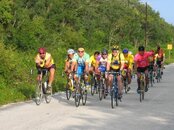I mountainbike 5-6 times a week, ~12-15 mile rides and am consistently with the top 10 fastest rides of the day.
I don’t think cycling has anything to do with the “problems” you’re describing, in fact, had you omit the part about cycling in your post, everything you’ve said still would make sense and it is the typical problems new divers, with improper gear and sub-optimal technique experiences. Consider this, does anything else you do in your daily routine, done like as if you’re on your bike? Do you walk to get the mail like a locomotive? As you sit on your chair reading/typing this, are you breathing heavy as if you’re on your bike? I know a bunch of avid cyclist which are also experienced divers, the answer to all of us is no.
Using up more air than the rest is a subject discussed very often, probably because every new diver experiences it and new divers are joining the sport all the time, so it’s constantly brought up, and it is normal, don’t overthink it, we can discuss all kinds of technique and in the end it’s simply more time in the water, it will improve with more diving.
Having your own gear will help things a lot too, you’ve realized that and understands why.
About the frog kicking, one less discussed aspect of it that helps you have a more relaxed diving with a slower pace and thus, energy saving, it’s that it makes it easier, more natural, to do a pause, because it’s symmetrical, after you kick and stop moving your feet, they’re both in the same position, we call it the gliding phase, after you kick, just keep the feet close together, with the blades parallel to the ground and slowly bring them up (bending knees), glide for as long as you can, my gliding phase will last no less than twice the time of the kicking phase.
Your(everyone’s) air consumption will improve the more diving you do, even if one maintains poor buoyancy/trim/technique through ones diving career, whatever their air consumption is early on, will improve if they keep diving regularly, but huge improvement will be very difficult without proper buoyancy and trim, and these two must come together. It is possible to have perfect neautral buoyancy and poor trim, but only if you’re stationary, otherwise, any propulsion you generate will move you either up or down in the water colum.
Poor buoyancy though, is the worst, when that is off, everything else is affected. Unfortunately the majority of divers can’t really stop kicking, they’d sink, adding air to their BCD would be correct action, but they will eventually kick again to get moving and that will make them rise, adjusting the trim then, would be the correct action, but instead they think the problem is too much air in the BCD, so they let a little out, now they don’t rise anymore, and they’re not sinking either, as long as they keep moving, and they all do, to various degrees of intensity. Long time, experienced divers do this more subtly, but it’s there, think experienced recreational instructors for exemple, looks like they have a hold of it, but go behind one and hold their feet, I guarantee you’d see them eventually sink.
Last thought on the long babbling, just keep in mind as you’re perfecting the buoyancy/trim/propulsion, your lungs obviously plays a part in this also, it’s where you fine tune the buoyancy, what needs to be kept in mind is that the breathing rate changes throughout the dive, because of various reasons, so the buoyancy in the BCD needs to be adjusted for that, then adjusted back to when breathing changes again, maintain a horizontal trim AT ALL TIMES, as that eliminates buoyancy changes due to propulsion, thus giving you wrong feedback about your buoyancy, every now and then, stop moving at all, this will give you great feedback about your buoyancy.
PS: Maybe you’re just a roadie, in which case you’re helpless







